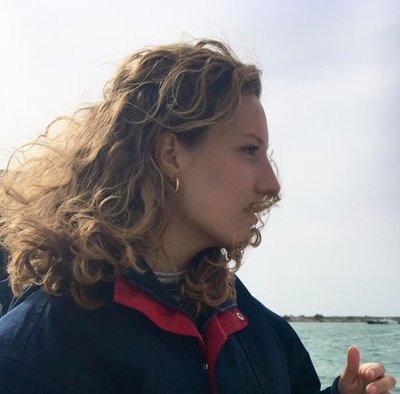Resume writing: 7 details to include before you shoot your shot
Feb 07, 2023
4 mins


Journaliste - Welcome to the Jungle
Have you ever sent an email without the promised attachment? Forgotten your umbrella on a rainy day? Or … left a critical detail off your resume? Well, we can’t help you with the email issue—or the umbrella for that matter—but job applications are at the heart of what we do. Career coach Mila Elhamdi is here to help you avoid seven unfortunate omissions and boost your chances of application success.
1. The title
What’s the first thing a recruiter is going to see when they look at your resume? The title—if you’ve included one. A title is a great way to give recruiters a clear and immediate idea of what you’re looking for. “If you’re uploading your resume to a database without knowing exactly what type of post you’re looking for, or simply sharing it with your network, then you should use your current job title,” says coach Elhamdi. Another option is to use the title of the post you’re applying for. In any case, adding a title to your resume is a win-win: “Not only does it help the recruiter—they can see what they’re dealing with from the first line,” says our expert, “but it also helps candidates to zero in on the keywords they want to highlight.” Result: increased coherency in your job search. “It’s also helpful for company career sites, as the keywords in resume titles may be used to identify and shortlist suitable profiles,” adds Elhamdi. A good title will increase the visibility of your resume.
2. Your previous roles
Another essential detail that’s often missing from resumes is a candidate’s actual role with previous employers. “That doesn’t mean simply giving your job title, the company name, and dates, followed by a list of your daily tasks,” explains Elhamdi. “What recruiters really want to know is why you were hired when you were.” For example, did your employer bring you on board to develop the company’s visual identity in a specific sector, or to launch a communications campaign in a new country? “Job titles such as project manager, coordinator, or communications executive are so generic that they’re almost meaningless if you don’t include details about the context,” the expert explains. Including domain-specific information will help you to show prospective employers exactly how your profile corresponds to the advertised role.
3. Project-specific details
Similarly, you can give your resume a boost by providing a more detailed description of projects you’ve worked on. “Instead of saying you ‘developed client portfolios,’ for example, give a detailed description that highlights your experience,” suggests Elhamdi. If you’re talking about working with clients, for instance, why not mention the type of client? This can be a great way of pinpointing your field of experience and showing a recruiter your skills. Give information about the geographical context, too: if you worked at national or international level, and in what countries. “Finally, you might also want to give specific data in terms of volume or figures, according to your field of work,” advises Elhamdi: “The number of projects, clients, campaigns, etc.” In short, you want to mention details that give a concrete, precise vision of the work you’ve done.
4. Presentation
Cover letters seem to be on the way out, and many candidates are opting to include an introductory paragraph or “profile” on their resume. “This short text, two or three lines maximum, is an opportunity to introduce yourself directly, and explain why you’re the perfect candidate for the post,” says Elhamdi. It can be a helpful way to grab the recruiter’s attention. “Obviously, a cover letter offers much more scope for presenting what you have to offer, but an introductory paragraph can also get you noticed, as long as it’s effective and clearly highlights what you can bring to that specific job.” You could talk about your ambitions in relation to the role in question, your career goals in the sector, or your broader career pathway—it’s up to you.
5. Hobbies and interests
The “hobbies and interests” section of a resume—if the candidate even includes one—often seems like an afterthought. “Personally, I pay careful attention to this section: it’s not essential, but it can pack a serious punch if it’s done properly,” confides Elhmadi. Talking about your extra-professional or other relevant activities is a way to add interest to your resume, and “humanizes” you in the eyes of a recruiter. “It’s an opportunity for the recruiter to see you as more of an individual, to create that initial connection,” says the specialist. “You’re not just a resume on a sheet of paper or a screen, but a living, breathing person.” The things you choose to mention can highlight skills or aspects of your life that aren’t necessarily obvious from your career path. They can reveal things about your character, values, and dedication, all of which will add value to your profile and make you stand out from the crowd.
6. Skill level
Candidates will often list skills without specifying a level of attainment. Obviously, if you’re not confident in your capacities or if you’re just starting out, you don’t want to draw attention to yourself. “But on the other hand, if you’re a whiz with graphic design tools or you’re completely fluent in a foreign language, make sure that’s obvious to the recruiter. If you use the right keywords for the context, you increase your chances of getting an interview,” says Elhamdi. Be as precise as you can, both in terms of the software you’ve mastered and your current skill level.
7. Academic projects
If you’re just starting out on your career path, you won’t have much professional experience to talk about. How can you make sure you stand out? “Rather than submitting a half-empty or basic resume, you could talk about your academic projects,” suggests Elhamdi. Just take care to present them properly! “If your college experience involved group work, study projects, or professional training of any kind, include these details on your resume.” Consider giving names of partner companies, methods, and the tools you used. “Talk about these projects in the same way you’d talk about professional experience.” Once again, keywords can make all the difference, so make sure you use the right terms to get you noticed.
At the end of the day, a carefully crafted resume will make recruiters see you in the best possible light with respect to a potential role. So make sure you use all of the tools you have available to display your skills and personality. “Last but not least, please remember to double-check everything before you hit send!”
Translated by Catherine Prady
Photo: Welcome to the Jungle
Follow Welcome to the Jungle on Facebook, LinkedIn, and Instagram, and subscribe to our newsletter to get our latest articles every day!

More inspiration: Creating a winning job application
Create a winning job application with these tips on resume and cover letter writing, job application strategies, and job application best practices.

The language of the job hunt: resumes and job applications
It can take some time to master the vocabulary of the job hunt. What do these terms mean and what's the difference between them? Let's find out.
Sep 07, 2022

Writing a cover letter: ditch the dull templates!
How many times have you searched "cover letter templates" on Google? Well, it's time to stop! Use your voice and share your originality.
Jul 12, 2022

The power of words: elevating your resume to promote your experiences
Good words are worth much and cost little. So how can you use them effectively on your resume to catch the attention of the recruiter?
Jun 30, 2022

Maximizing your resume's impact: aligning your skills with job descriptions
By tailoring your resume and cover letter to each job offer, you're more likely to attract the recruiter's attention.
Jun 23, 2022

Crafting a compelling cover letter for hidden job opportunities
You've found your dream company. But there are no open positions. Should you give up? No! Use these tips to write a strong unsolicited cover letter.
Jan 07, 2020
The newsletter that does the job
Want to keep up with the latest articles? Twice a week you can receive stories, jobs, and tips in your inbox.

Looking for your next job?
Over 200,000 people have found a job with Welcome to the Jungle.
Explore jobs